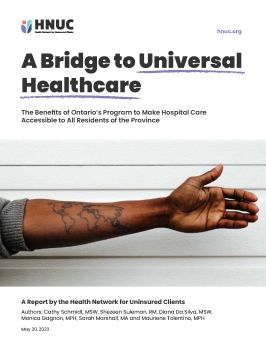A bridge to universal healthcare: The benefits of Ontario’s program to make hospital care accessible to all residents of the province
The 2023 report A bridge to universal healthcare by the presents a significant opportunity to assess the impact of the Ontario Ministry of Health's decision to extend hospital care funding to uninsured Ontario residents. HNUC's report draws upon survey and interview data from 18 health care professionals and six key informants.
The report authors highlight how current Canadian immigration policies result in temporary immigration statuses that limit access to provincial health insurance. Prior to the expanded funding directive implemented by the Ontario Ministry of Health in March 2020, uninsured individuals had to cover the costs of essential medical care out of pocket, leading to significant financial barriers and population ill health.
According to the report, the expanded coverage facilitated by the funding directive significantly improved medical care access for uninsured individuals in Ontario, yielding various health benefits. Many of these benefits relate to the interface between primary care and public health, including enhanced access to mental health care, and improved outcomes and experiences in prenatal, obstetric and postnatal care. Importantly, the authors note that the directive played a crucial role in reducing morbidity and mortality among uninsured individuals dealing with serious and chronic conditions such as cancer and HIV (p. 13). This was achieved by reducing delays in accessing care, enhancing treatment availability and providing earlier detection.
The directive also substantially contributed to the well-being of uninsured populations by alleviating financial hardships and reducing psychological stress. Interestingly, the directive yielded system-level benefits, resulting in reduced administrative workload, simplified navigation and advocacy processes, and cost savings by providing earlier treatment for acute issues.
The report also offers program and policy recommendations aimed at enhancing health care accessibility for all Ontario residents, including measures such as full and permanent immigration status for all migrants. The directive’s temporary nature means that uninsured individuals have now lost the essential and health-promoting medical coverage they once had. Consequently, this report equips public health professionals with timely and invaluable data to guide action on immigration policy reform for health equity.
Use this resource to:
- develop an understanding of how immigration status directly impacts health care access and thereby fosters health inequities,
- advocate for permanent changes to improve provincial and territorial health insurance coverage, and
- link immigration policy with public health practice and population health outcomes.
Alignment with NCCDH work:
Immigration status is a foundational determinant of health. The NCCDH is building a repertoire of resources focusing on this determinant and guiding public health to take action on health inequities experienced by the migrant populations in Canada.
Equity in Action: Niagara Region adapts their COVID-19 response to prioritize seasonal agricultural workers
Disrupting migrant work (Mind the Disruption, Season 1, Episode 4)
Related Resources:
Unheeded warnings: COVID-19 and migrant workers in Canada
Related organization: Migrant Workers Alliance for Change
Reference
Da Silva, D., Schmidt, C., Suleman, S., Gagnon, M., Marshall, S., & Tolentino, M. (2023). A bridge to universal healthcare: The benefits of Ontario’s program to make hospital care accessible to all residents of the province. Health Network for Uninsured Clients. https://www.hnuc.org/reports
Tags: Access to health services, Immigration, Community Organization, Document, Report / Document
